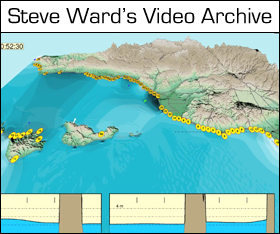Explore Topics
Explore our library of topics!
![]() Earthquakes
Earthquakes
An earthquake is like a snap of your fingers. Pressure builds until—snap!—the pressure gets too high and releases. The same thing happens along an earthquake fault line, a "crack" in the earth's crust.
EXPLORE to learn why earthquakes happen, why earthquakes happen in some places more than others, and why some earthquakes are more dangerous.
Image credit: U.S. Geological Survey
Read more »![]() Tsunamis
Tsunamis
Tsunamis are huge, destructive waves caused by the sudden displacement of large volumes of water. Most tsunamis are caused by earthquakes, but they can also be caused by landslides, volcanoes, glacier collapse, and even meteorites.
EXPLORE to learn about tsunami warning signs, the destruction they can cause, and the largest tsunami on record.
Image credit: David Rydevik
Read more »![]() Liquefaction
Liquefaction
Soil liquefaction is when strong ground shaking from earthquakes makes soil flow like a liquid. A common analogy is that the solid ground is transformed by the shaking into something like quicksand.
EXPLORE to learn why liquefaction happens and why the San Francisco Bay is especially at risk.
Image credit: Japan National Committee on Earthquake Engineering
Read more »![]() Hurricanes
Hurricanes
Hurricanes, tropical cyclones and typhoons are high-speed, spiraling storms with winds that reach a constant speed of 119 km/h (74 mph). These storms are accompanied by severe thunderstorms, lightning, waterspouts, hail, high surf and waves, and other severe weather.
EXPLORE to learn about the classification of these storms, the science behind them, and storm tracking and forecasting.
Image credit: Stocktrek
Read more »![]() Floods
Floods
Flooding occurs when water arrives at a rate faster than it can drain downhill, evaporate, or absorb into the ground. Floods are commonly caused by severe storms, melting snowpack, and sudden releases of water barriers (dams, levees, glaciers).
EXPLORE to learn the dangers of flooding, how flooding can compound the danger of other disasters, and how you can find out if you live in a flood zone.
Image credit: John Chroston
Read more »![]() Seismology
Seismology
Seismology is the study of earthquakes. Seismologists may focus on the sources of earthquakes, such as tectonic plate movement, or related events, such as tsunamis. OpenHazards seismologists research methods to forecast earthquakes.
EXPLORE to learn about the tools of seismology, how earthquakes are measured, and the math and science behind the scenes.
Image credit: Sunset Crater Volcano Natl. Monument/Crickett
Read more »![]() OpenHazards Forecasts
OpenHazards Forecasts
A seismic forecast gives the odds of an earthquake happening for a particular place, time frame, and magnitude (strength). The innovative OpenHazards forecast method is updated daily to adapt to new changes in earthquake probabilities worldwide.
EXPLORE to learn the difference between forecasts and predictions, how forecasts are tested, and how OpenHazards forecasts stand apart.
Image credit: OpenHazards Group
Read more »![]() Earthquake Myths
Earthquake Myths
Can animals predict earthquakes? Can some people sense that an earthquake is about to happen? Will California eventually fall into the ocean?
EXPLORE to learn the truth about some common earthquake myths.
Image credit: NASA/Stöckli/Simmon/Modis/USGS/DMSP/Reuters/OpenHazards
Read more »Poll
| 1. | Tokyo | 68 |
| 2. | Los Angeles | 25 |
| 3. | Manila | 18 |
| 4. | Bandung | 17 |
| 5. | Santiago | 16 |
| 6. | Nagoya | 9.4 |
| 7. | Osaka | 9.4 |
| 8. | Jakarta | 9 |
| 9. | Lima | 8 |
| 10. | Chengdu | 7.5 |




